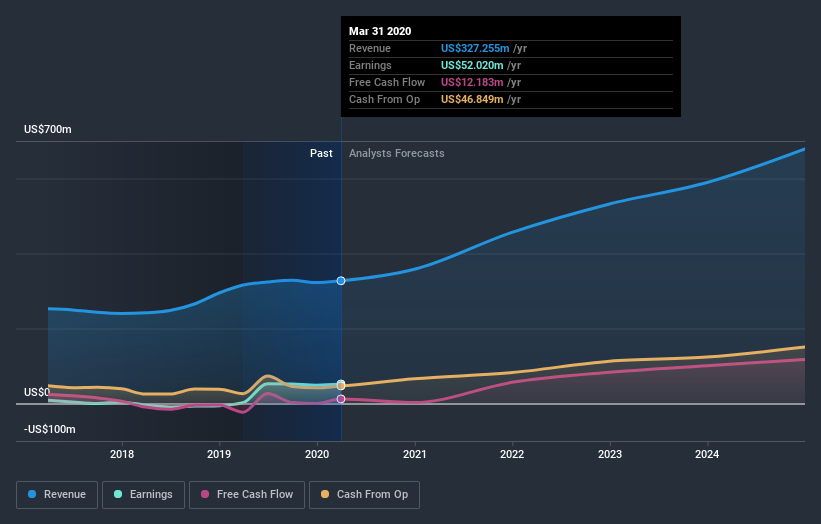Here's What Amphastar Pharmaceuticals, Inc.'s (NASDAQ:AMPH) Shareholder Ownership Structure Looks Like

If you want to know who really controls Amphastar Pharmaceuticals, Inc. (NASDAQ:AMPH), then you'll have to look at the makeup of its share registry. Institutions will often hold stock in bigger companies, and we expect to see insiders owning a noticeable percentage of the smaller ones. I quite like to see at least a little bit of insider ownership. As Charlie Munger said 'Show me the incentive and I will show you the outcome.
Amphastar Pharmaceuticals has a market capitalization of US$925m, so we would expect some institutional investors to have noticed the stock. Taking a look at our data on the ownership groups (below), it's seems that institutions own shares in the company. Let's take a closer look to see what the different types of shareholder can tell us about Amphastar Pharmaceuticals.
View our latest analysis for Amphastar Pharmaceuticals
What Does The Institutional Ownership Tell Us About Amphastar Pharmaceuticals?
Many institutions measure their performance against an index that approximates the local market. So they usually pay more attention to companies that are included in major indices.
As you can see, institutional investors have a fair amount of stake in Amphastar Pharmaceuticals. This implies the analysts working for those institutions have looked at the stock and they like it. But just like anyone else, they could be wrong. If multiple institutions change their view on a stock at the same time, you could see the share price drop fast. It's therefore worth looking at Amphastar Pharmaceuticals's earnings history, below. Of course, the future is what really matters.
Since institutional investors own more than half the issued stock, the board will likely have to pay attention to their preferences. Hedge funds don't have many shares in Amphastar Pharmaceuticals. Applied Physics & Chemistry Laboratories, Inc. is currently the largest shareholder, with 15% of shares outstanding. With 13% and 5.6% of the shares outstanding respectively, BlackRock, Inc. and Federated Hermes, Inc. are the second and third largest shareholders. Additionally, the company's CEO Yongfeng Zhang directly holds 0.0433135 of the total shares outstanding.
On further inspection, we found that more than half the company's shares are owned by the top 7 shareholders, suggesting that the interests of the larger shareholders are balanced out to an extent by the smaller ones.
While it makes sense to study institutional ownership data for a company, it also makes sense to study analyst sentiments to know which way the wind is blowing. Quite a few analysts cover the stock, so you could look into forecast growth quite easily.
Insider Ownership Of Amphastar Pharmaceuticals
While the precise definition of an insider can be subjective, almost everyone considers board members to be insiders. Company management run the business, but the CEO will answer to the board, even if he or she is a member of it.
Most consider insider ownership a positive because it can indicate the board is well aligned with other shareholders. However, on some occasions too much power is concentrated within this group.
Shareholders would probably be interested to learn that insiders own shares in Amphastar Pharmaceuticals, Inc.. In their own names, insiders own US$82m worth of stock in the US$925m company. It is good to see some investment by insiders, but it might be worth checking if those insiders have been buying.
General Public Ownership
The general public, with a 24% stake in the company, will not easily be ignored. While this group can't necessarily call the shots, it can certainly have a real influence on how the company is run.
Private Company Ownership
We can see that Private Companies own 15%, of the shares on issue. It might be worth looking deeper into this. If related parties, such as insiders, have an interest in one of these private companies, that should be disclosed in the annual report. Private companies may also have a strategic interest in the company.
Next Steps:
While it is well worth considering the different groups that own a company, there are other factors that are even more important. Take risks, for example - Amphastar Pharmaceuticals has 2 warning signs we think you should be aware of.
But ultimately it is the future, not the past, that will determine how well the owners of this business will do. Therefore we think it advisable to take a look at this free report showing whether analysts are predicting a brighter future.
NB: Figures in this article are calculated using data from the last twelve months, which refer to the 12-month period ending on the last date of the month the financial statement is dated. This may not be consistent with full year annual report figures.
This article by Simply Wall St is general in nature. It does not constitute a recommendation to buy or sell any stock, and does not take account of your objectives, or your financial situation. We aim to bring you long-term focused analysis driven by fundamental data. Note that our analysis may not factor in the latest price-sensitive company announcements or qualitative material. Simply Wall St has no position in any stocks mentioned.
Have feedback on this article? Concerned about the content? Get in touch with us directly. Alternatively, email editorial-team@simplywallst.com.



